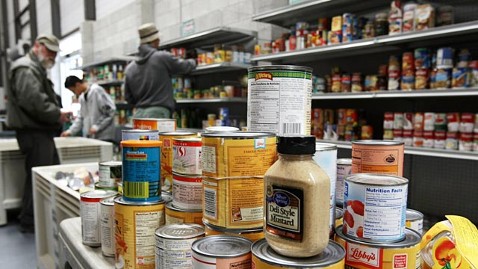Federal Government, Charities Struggle to Combat Hunger

Justin Sullivan/Getty Images
As Congress attempts to tighten its fiscal belt, government aid for the record number of poor and hungry Americans has lagged behind.
In a weak economy, rising unemployment and higher food prices, the number of “food insecure” households is at a record high. And the federal government is struggling to meet demand for food stamps as it cuts its own budget.
In 2010, nearly 49 million people could not afford adequate food, according to the U.S. Department of Agriculture. That’s one in seven households, one of the highest numbers recorded in recent history. Even once well-to-do families who were donors are now finding themselves turning to food banks for help. The number is “unprecedented,” said USDA Under Secretary Kevin Concannon.
“Millions of Americans are faced with the self-realization that ’I never thought I would find myself in this situation,’” Concannon said in a conference call Tuesday. “Those are the words we have heard in government offices, in food banks.”
Children have been particularly hard hit. Feeding America, one of the largest nonprofit organizations helping the hungry, saw the number of children that come to its food banks jump to 12.5 million in 2010, versus 9 million in 2009. Between the two years, overall demand in its network jumped by 46 percent.
The situation is “heartbreaking,” said Feeding America’s chief executive Vicki Escarra.
“The numbers are numbing in sheer size but behind those numbers are people,” she said.
Southern states, led by Mississippi, Texas and Arkansas, have the highest number of hungry people in the nation.
But even as the economy forces more people to turn to food banks and government-assisted programs, the federal government is struggling to keep up with the demand. In 2008, then-candidate Barack Obama promised to end childhood hunger by 2015 and expand the government’s nutrition assistance programs, but that goal remains far from being achieved.
The government’s signature nutrition programs are caught in bipartisan wrangling in Congress as lawmakers struggle to agree on budget cuts.
Republicans say the program is out of control and want to tighten its restrictions. Sen. Jeff Sessions told ABC News last month that federal aid has surged, partly because of abuse, and that “nobody is looking under the hood.” Democrats say their opponents are unfairly targeting the poor. Eight Democratic members of Congress last month went on a food stamp diet — a budget of about $4.50 per day — to oppose cuts.
The conference report for the fiscal 2012 appropriations bill that passed this month expands the government’s signature Supplemental Nutrition Assistance Program, providing more than $80 billion in funding, about $1 billion less than what Obama had requested in his 2012 budget, but an increase over the previous year.
Nearly 46 million Americans benefited from SNAP this year, the highest number in recorded history. That figure is not a surprise, given that poverty also rose to the highest level since the Census bureau started compiling data. The Census Bureau indicates that SNAP would lift 3.9 million Americans, including 1.7 million children, out of poverty if its benefits were included in the official measures of income and poverty.
Congress is also set to expand funding for child nutrition programs to more than $18 billion, higher than the previous year.
But the budget cuts funding for the Special Supplemental Nutrition Program for Women, Infants and Children (WIC). The current budget allocates $6.6 billion for the program, $1 billion less than what was provided in the previous fiscal year.
The automatic cuts triggered by the failure of the supercommittee will also reducing funding for the WIC program by $600 million. SNAP and child nutrition programs are exempt from those cuts.
Budget cuts at the federal level are likely to compound the problem in the nonprofit sector, which has seen donations decline amid a weak economy. For many, government assistance is still not enough. More than half of SNAP beneficiaries are turning to food banks for help at least six months out of the year, Escarra said.
“Cutting food funding at this time … seems unfathomable,” she said. “The simple reality is that charity cannot make up the difference.”
Advocates have turned to celebrities to raise awareness about the issue. “Glee” star Mark Salling this month became the latest celebrity to rally for the cause. Salling is the spokesman for the Child Hunger Ends Here campaign, sponsored by Feeding America, ConAgra Foods and Schools Fight Hunger.